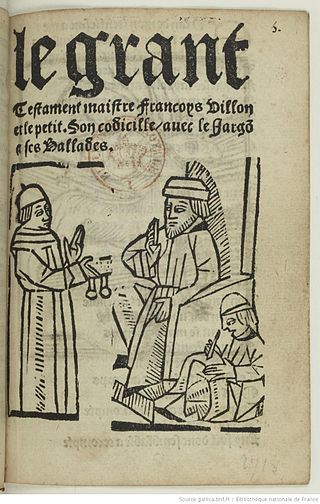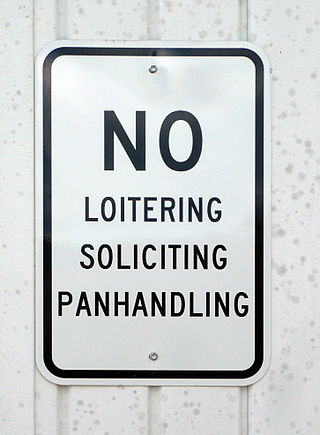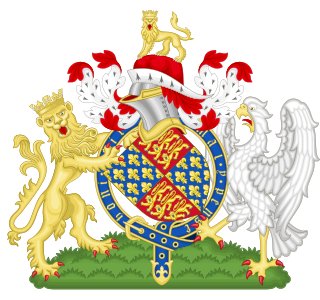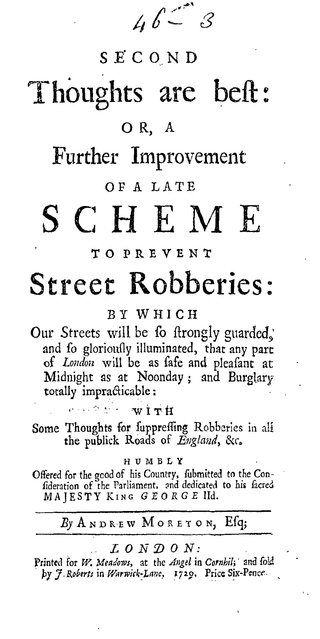Related Research Articles

Bethlem Royal Hospital, also known as St Mary Bethlehem, Bethlehem Hospital and Bedlam, is a psychiatric hospital in Bromley, London. Its famous history has inspired several horror books, films, and TV series, most notably Bedlam, a 1946 film with Boris Karloff.
"Tom o' Bedlam" is the title of an anonymous poem in the "mad song" genre, written in the voice of a homeless "Bedlamite". The poem was probably composed at the beginning of the 17th century. In How to Read and Why Harold Bloom called it "the greatest anonymous lyric in the [English] language."

Thieves' cant is a cant, cryptolect, or argot which was formerly used by thieves, beggars, and hustlers of various kinds in Great Britain and to a lesser extent in other English-speaking countries. It is now mostly obsolete and used in literature and fantasy role-playing, although individual terms continue to be used in the criminal subcultures of Britain and the United States.

A Caveat or Warning for Common Cursitors, vulgarly called vagabonds was first published in 1566 by Thomas Harman, and although no copies of that edition survive, it must have been popular, because two printers were punished by the Stationers' Company in 1567 for pirated editions. Two editions were published in 1568, and a revised edition in 1573. It is one of the fundamental texts for rogue literature.

Loitering is the act of standing or waiting around idly without apparent purpose in some public places.

The act 7 Ric. 2. c. 5 (1383), sometimes called the Beggars Act 1383, the Vagrancy Act, or the Vagabonds Act 1383, was an act of the Parliament of England made at Westminster in 1383, after the Peasants' Revolt (1381).

The Vagabonds Act 1597 was an Act of the Parliament of England, which aimed to address concerns of vagrancy.

St Luke's Hospital for Lunatics was founded in London in 1751 for the treatment of incurable pauper lunatics by a group of philanthropic apothecaries and others. It was the second public institution in London created to look after mentally ill people, after the Hospital of St. Mary of Bethlem (Bedlam), founded in 1246.
A Jovial Crew, or the Merry Beggars is a Caroline era stage play, a comedy written by Richard Brome. First staged in 1641 or 1642 and first published in 1652, it is generally ranked as one of Brome's best plays, and one of the best comedies of the Caroline period; in one critic's view, Brome's The Antipodes and A Jovial Crew "outrank all but the best of Jonson."

Vagrancy is the condition of wandering homelessness without regular employment or income. Vagrants usually live in poverty and support themselves by travelling while engaging in begging, scavenging, or petty theft. In Western countries, vagrancy was historically a crime punishable with forced labor, military service, imprisonment, or confinement to dedicated labor houses.

The Vagrancy Act 1824 is an Act of Parliament of the United Kingdom that makes it an offence to sleep rough or beg in England and Wales. The legislation was passed in Georgian England to combat the increasing number of people forced to live on the streets due to the conclusion of the Napoleonic Wars and the social effects of the Industrial Revolution. Critics of the law included politician and abolitionist, William Wilberforce, who condemned the Act for making it a catch-all offence for vagrancy with no consideration of the circumstances as to why an individual might be homeless.

The lunatic asylum, insane asylum or mental asylum was an institution where people with mental illness were confined. It was an early precursor of the modern psychiatric hospital.
"Ne'er-do-well" is a derogatory term for a good-for-nothing person; or a rogue, vagrant or vagabond without means of support. It is a contraction of the phrase never-do-well.

Beggars' badges were badges and other identifying insignia worn by beggars beginning in the early fifteenth century in Great Britain and Ireland. They served two purposes; to identify individual beggars, and to allow beggars to move freely from place to place.

John Monro was a physician specializing in the treatment of madness at Bethlem Hospital in London, better known as Bedlam.
Bedlam is a British mental health documentary that was filmed at South London and Maudsley NHS Foundation Trust (SLaM). The series offers unprecedented access to clinical services, patients and staff at the Trust.

Second Thoughts Are Best: or, a Further Improvement of a Late Scheme to Prevent Street Robberies is a 1729 pamphlet by Daniel Defoe. He wrote it under the name of Andrew Moreton Esq., presented as a dissatisfied middle-class old man who was extremely concerned about the increase in criminality around the 1720s.

The Vagrancy Act 1898 was a piece of legislation in England and Wales that criminalised men who lived off the earnings of prostitution (pimping) and who solicited in public places. The bill was generally viewed as successful in its impact, leading to the similar Immoral Traffic (Scotland) Act.

The Egyptians Act 1554 was an Act of the Parliament of England regarding Romani and travellers within the realm. The act was passed to amend previous laws regarding the Romani people. The Egyptians Act 1530 did not cover Gypsies who were born in England or those who came to England by way of Scotland.

Liber Vagatorum[a] is an anonymously authored text first printed in Pforzheim, southwestern Germany, likely in 1509 or 1510. It consists of three sections: the first provides a catalogue of various types of wandering beggars, the second outlines the deceptive practices they are alleged to use, and the third offers a glossary of terms in Rotwelsch, a cant used by vagrants. Despite its Latin title, Liber Vagatorum is predominantly written in German, making it accessible to a broader audience beyond the scholarly class. While traditionally attributed to Matthias Hütlin, a 16th-century Spitalmeister of Pforzheim, this authorship remains contested.
References
- ↑ Chisholm, Hugh, ed. (1911). . Encyclopædia Britannica . Vol. 1 (11th ed.). Cambridge University Press. p. 72.
- ↑ Quoted in A. L. Beier, Masterless Men: The Vagrancy Problem in England 1560–1640 1985, p. 115; ISBN 978-0-416-39020-9
- ↑ Ribton-Turner, C. J., Vagrants and Vagrancy and Beggars and Begging, London, 1887, p.172
- Carroll, W. C. Fat King Lean Beggar; Representations of Poverty in the Age of Shakespeare Cornell UP, Ithaca & London, 1996
- The Wordsworth Dictionary of Phrase and Fable